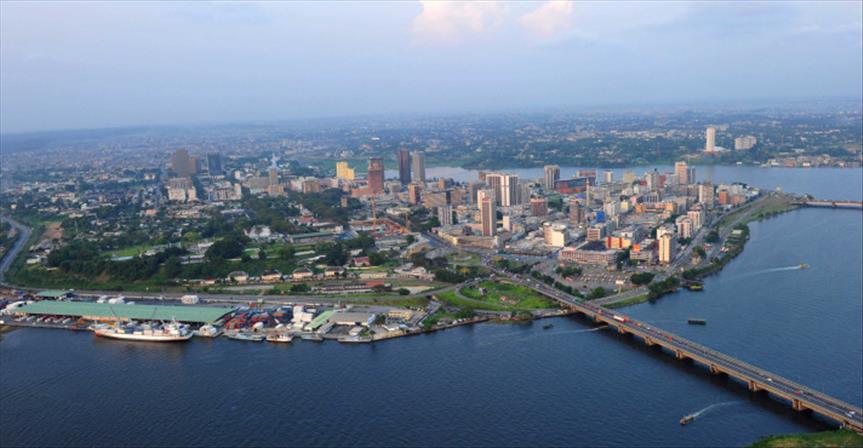
By Kingsley Kobo
ABIDJAN
Lifestyles are expected to change in Ivory Coast as of August, when an official ban on sachet-type plastic bags – widely used for water – comes into effect.
"Consumers litter the streets with the empty plastic bags after using their contents and sellers as well as manufacturers have no organized system of packing the waste," Environment Minister Remi Allah-Kouadio told Anadolu Agency.
"There was no other option than simply banning the use of plastic materials to protect our environment and sanitation facilities," he said.
The decision was initially announced in May 2013 and meant to come into effect in November of the same year.
But the ban was suspended following a storm of protest from manufacturers of plastic products, industry workers and traders.
Ivory Coast is said to have one of the best and most reliable potable water systems in the West African sub-region.
But a population explosion in Abidjan, Ivory Coast's largest city, to six million, along with a fall in local purchasing power, has encouraged the production and sale of the now popular 500ml polyethylene water sachets.
Each water packet goes for 50 francs CFA ($0.002). They are usually sold, ice-cold, at roadside.
They are also hawked to commuters at traffic lights across the city by teenage girls and boys.
Minister Allah-Kouadio said there was no going back on the ban on production, import, marketing and possession of non-biodegradable plastic.
He said such packages constituted much of the waste generated throughout the country, which clogs gutters and increases the risk of flooding during the rainy season.
-Risks-
In addition to its environmental and sanitary implications, local experts have also expressed concern over the safety of the sachet-packed water.
"Most of the local manufacturers of sachet water carry out their production in their backyard; nobody cares to know the source of the water used, whether it is well filtered or well treated with required chemicals," Dr. Eugene Diomande of the National Health Institute told AA.
"Consumers rush to buy these sachets because they can't afford bottled mineral water, but they ignore the health consequences," he said. "If just one unit of production uses a contaminated source, it can cause a nationwide outbreak of disease, like cholera."
The excess waste created by the disposal of the packets, the expert added, flows into rivers and the sea, adversely impacting the local ecosystem.
Ivory Coast joins other African countries – including Rwanda, Chad, Congo, Tanzania, Guinea Bissau and South Africa – that have likewise banned non-biodegradable plastic with satisfactory results.
-Bad for business-
But investors and traders oppose the ban and warn of economic repercussions.
"Those are not enough reasons to throw thousands of workers out of [their] jobs," Ivory Coast Consumer Union Chairman Soumahoro Ben N'faly told AA.
"More than 90 percent of Ivorian families use plastic bags in their daily activities. How do we change that overnight?" he fumed.
According to Ivory Coast's Chamber of Commerce and Industry, the local plastic production and distribution industry consists of some 80 small and medium enterprises and employs some 45,000 people directly and 55,000 indirectly, while generating approximately $400 million per year.
Michel Djimi, chairman of the Plastic Industry Workers Union, warns that jobs will be lost while companies will relocate to neighboring countries if the government goes ahead with the ban.
"Ivory Coast is reviving gradually from a civil war. Families lost jobs, homes and savings," Djimi told AA. "Times are hard. The prohibition of plastic bags would not only throw workers out of [their] jobs, but their children and spouses would suffer as well."
Ali Kafal, a Lebanese business tycoon who owns a plastic factory in Abidjan, said the government ban was too abrupt given the volume of raw material in stock for planned future plastic production.
"Most of us who run plastic factories in Ivory Coast have raw materials worth millions of dollars, imported years ago," he told AA. "How do you expect us to discard them within months?"
But after months of consultations between manufacturers and the government, including Prime Minister Daniel Kablan, the authorities decided to issue an exemption for military, medical and agricultural activities, and during times of war.
Minister Kouadio told AA that manufacturers also had the option of channeling their stockpiles of raw material into the production of biodegradable bags, which would henceforth become the standard.
But even this, Kafal said, would entail the acquisition of new machines and chemicals and fresh training for staff.
The government, for its part, insists that August will be the final deadline for bidding farewell to the non-biodegradable plastic bags in this country of 22 million.
englishnews@aa.com.tr


